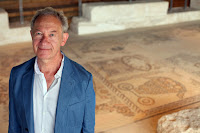After months deliberately avoiding
unnecessary trauma, I have finally read the UK government’s lengthy and repetitive White Paper
proposing drastic reform of Higher Education, Success as a Knowledge Economy. I am aghast. And it’s not just the shocking verbosity of
whichever Whitehall bureaucrat is responsible, although s/he has a peculiar
taste in mixed metaphors which a short course on classical rhetoric would have zapped: our economic landscape apparently needs a level playing field with
sustainable financial architecture.
The ‘success’ of graduates from
different institutions will be officially and solely measured financially through tax data to yield ‘information about the rewards that could be
available at the end of their learning, alongside the costs’. So much
for all the evidence that Higher Education is linked to other ‘rewards’
including better health, longevity, life satisfaction and happiness levels, and the social, cultural
and economic wellbeing of communities within which universities operate. The implication is also that the students only come from and subsequently live in areas taxed by the UK inland revenue, rather than from all over the world. Little Englandism again.
 |
| "Satisfied Minds": Early Women Undergrads at Bedford College |
I do not understand how little protest there has been from the HE community and especially from the smaller Humanities
subject areas like Classics. These are always the first to be threatened if
decisions with long-term implications for the self-destruction of British
culture are determined by short-term financial exigencies. I can only assume
that the revolting xenophobia of the current cabinet has made it difficult for
HE staff to think about much else.
The smug Preface by our Etonian and
Oxonian Minister of State for Universities, Science, Research and Innovation, Jo Johnson, claims that British Universities
can only stay excellent if they
1.
are set in
brutal competition with one another as businesses and undergo ‘market exit’ as
soon as they become unprofitable;
2. hand over all power for determining what is studied
at universities to teenaged ‘consumers’, i.e. university applicants deemed by the
nation to be too immature to vote on anything else;
3. infantilise young adults by increasing contact time between teachers and students and cutting down independent study;
4. foster a fear culture by submitting to Kafkaesque ‘measurements’ of teaching quality by unspecified
government agents;
5. allow
HEFCE etc to be replaced not by a funding council but ‘a single market
regulator’, a new Office for Students;
6. allow
the seven discrete and autonomous Research Councils to be disbanded and rolled into one, UK
Research and Innovation (UKRI); this will inevitably mean less funding
for the small Humanities research areas--Philosophy, Classics, Pre-Modern History--in which the UK has always excelled and
on which much of its reputation for having great universities rests.
 |
| Jo Johnson (second from right), our Universities Minister |
Some of the most sinister language
concerns swift closure of unprofitable courses or institutions: ‘we must
accept that there may be some providers who need or choose to close some or all
of their courses, or to exit the market completely. The possibility of exit is
a natural part of a healthy, competitive, well-functioning market.’ The psychological
effects on current and former students of the public ‘failure’ constituted by the 'exit’ of their course or university are of course not addressed.
 |
| Aristotle's Lyceum, the First Uni to combine Research & Teaching |
I left a well-paid job in business after
I graduated because I was bored, miserable and unfulfilled in a way for which no
amount of cash could ever compensate. As
a university teacher I have enjoyed rich ‘rewards’ from helping hundreds of
students stand confidently on their own intellectual feet. I am proud to say
that few of those to whom I have taught basic Greek philosophy will have any
difficulty spotting the logical flaws, ideological constriction and impoverished
vision of humanity in this nauseating tract.
 |
| 'Education' at Yale (1890) by Louis Comfort Tiffany: Truth, Labour, Devotion, Science, Intuition, Research, Light, Life |




























